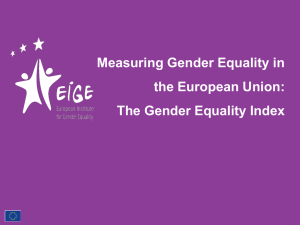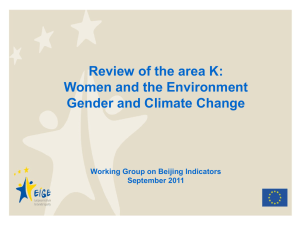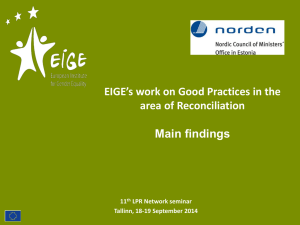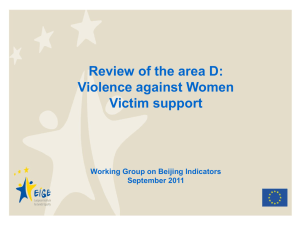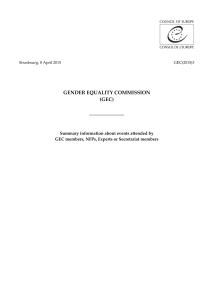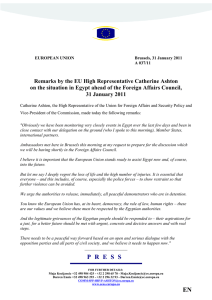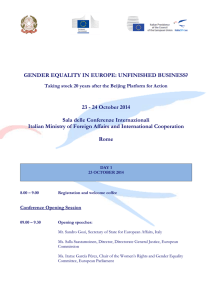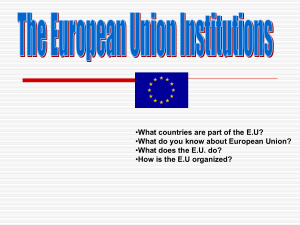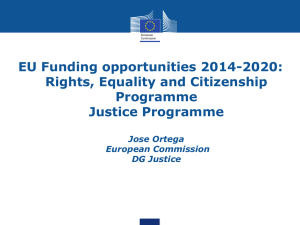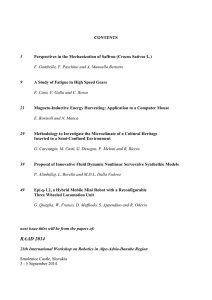Gender Equality Index
advertisement
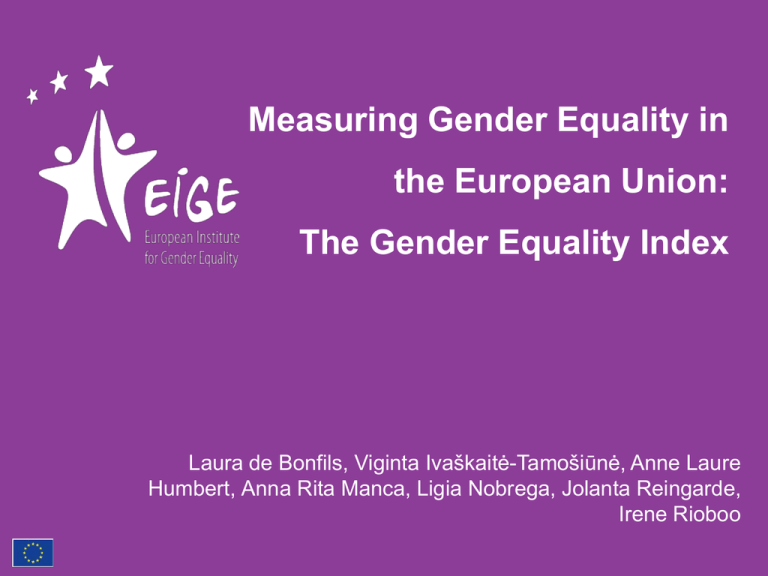
Measuring Gender Equality in the European Union: The Gender Equality Index Laura de Bonfils, Viginta Ivaškaitė-Tamošiūnė, Anne Laure Humbert, Anna Rita Manca, Ligia Nobrega, Jolanta Reingarde, Irene Rioboo & more… 2 ‘equal share of assets and equal dignity and integrity between women and men’ 3 Gender gaps adjusted for levels of achievement … why another index ? A synthetic indicator obtained when individual indicators are compiled into a single measure, on the basis of a multidimensional concept 6 10 guiding principles •Step 1. Developing a conceptual framework •Step 2. Selecting indicators •Step 3. Multivariate analysis •Step 4. Imputation of missing data •Step 5. Normalisation of data •Step 6. Weighting and aggregation •Step 7. Robustness and sensitivity •Step 8. Links to other indicators •Step 9. Back to the details •Step 10. Presentation and dissemination 9 Selecting variables Focus on individual and outcomes variables Reliable, comparable and harmonised data for the 27 EU Member States. Conceptual framework Measurement framework 11 VS 60 50 Weights 40 30 3 636 indices Aggregation Imputation 20 10 Country 1 Country 2 ...... Country 27 14 The Gender Equality Index Inequality 1 Equality 100 Quality Assessment 45% 40% 35% Distribution of differences between ranks 30% 25% 20% 15% 10% 5% 0% -14 -12 -10 -8 -6 -4 -2 Rank difference interval [-2, 2] [ -1, 1 ] [0] 0 2 4 6 8 Percentage of cases 86% 71% 42% 10 12 14 1 index 6 domain indices 12 sub-domain indices 27 variables Women remain less likely to participate in the labour market Large gender segregation in the labour market remains prevalent The gendered nature of quality of work needs to be measured Participation Segregation and quality of work FTE employment Duration of working life Sectoral segregation Flexibility of working time Health and safety Training at work 69.9 76.6 58% 40% UK, 2010 The FTE employment rate is higher for men than women throughout all Member States Men’s FTE participation in the UK is slightly higher than the EU average (56%) while women’s FTE participation is slightly lower (41%) Women receive lower earnings and income than men in the EU Women are at a disadvantage in terms of their economic situation Individual rather than household level indicators could measure gender differences in a more sensitive way Financial resources Earnings Income Economic situation Not at-risk-of-poverty Income distribution 68.9 74.3 25 25% Men consistently earn more than women in all Member States EU-27 average 20% UK, 2010 The UK gap is the third highest in the EU after Austria and Estonia Women outnumber men as university graduates in the EU Gender segregation in educational fields remains high Participation in lifelong learning is low and is more feminised where participation is higher Education attainment and segregation Participation in tertiary education Segregation Lifelong learning Participation in formal or non-formal education and training 68.8 48.9 31% 30% Reversal in trends in educational attainment since 2008 EU-27 average 22% for women compared with 21% for men UK, 2010 UK second highest level of achievement after Ireland, combined with a low gender gap Feminine segregation patterns in teaching, health and humanities field of education. 53% EU-27 average 44% for women compared with 22% for men 29% UK, 2010 The gap is persistent also in UK Women remain disproportionately responsible for caring activities The unequal division of time extends to other activities Addressing the division of time can provide an opportunity towards transformative change Care activities Social activities Childcare activities Domestic activities Sport, culture and leisure activities Volunteering and charitable activities 38.8 43.2 82% 40% Many more women than men spent, on average, one or more hours a day on housework and cooking EU-27 average is 77% of women compared with 24% of men UK, 2010 There are also important differences in the UK, but the gap is narrower Low levels of gender equality in political decision-making The lowest gender equality score can be found in economic decisionmaking Key actions should be taken to consider gender balance in decisionmaking Political Economic Ministerial Parliamentary Regional assemblies Members of boards Members of Central Bank 35.2 38.0 13% 87% UK, 2010 Men are greatly over-represented as board members throughout all Member States The situation of the UK is approximately the same as the EU27 average Low gender gaps exist in access to health structures The old adage that ‘women get sicker and men die younger’ remains largely true Status Self perceived health Life expectancy Healthy life years Access Unmet medical needs Unmet dental needs 90.1 95.4 Women outlive men across all Member States 83 79 UK, 2010 In the EU-27, women are expected to live up to 82.9 years compared with 77 years for men The gap in the UK reflects approximately the situation in EU-27 Disparities between women and men among different groups matter as these may be linked to different levels of gender equality Not in education, employment nor training NEETs Number of Member States by NEETs rate 11 13 6 4.3-10.8 % 10.9 -14.9 % 15-22 % Average Work score in the Gender Equality Index 4.3-10.8 % 72 10.9-14.9 % 65 15-22 % 62 The biggest gap of all Nothing to see here ! 69.0 68.9 90.1 38.8 48.9 38.0 54.0 60.4 Results at the country level Policy initiatives to promote gender equality Key socio-economic indicators http://eige.europa.eu/content/gender-equality-index How can we move forward when half of us are being held back? The Index Team Cristina Alvarez Pascual – Research Assistant Cristina.Alvarez@eige.europa.eu Laura de Bonfils – Research Assistant Laura.debonfils@eige.europa.eu Viginta Ivaškaitė-Tamošiūnė – Research Assistant Viginta.IvaskaiteTamosiune@eige.europa.eu Anne Laure Humbert – Gender Expert Anne.Humbert@eige.europa.eu Anna Rita Manca – Statistics Officer Anna.Manca@eige.europa.eu Ligia Nobrega – Gender Expert Ligia.Nobrega@eige.europa.eu Jolanta Reingarde – Senior Researcher Jolanta.Reingarde@eige.europa.eu Irene Rioboo – Seconded National Expert Irene.Rioboo@eige.europa.eu
